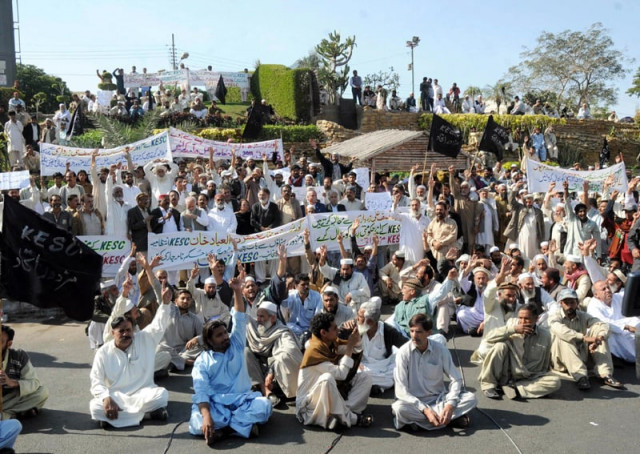Voluntary Separation Scheme: No silver bullet, as unions war with KESC over golden handshake
After 3,000 out of 4,500 workers accept package, the remaining continue protest.

In a sensational move to draw attention to their cause, two Karachi Electric Supply Company (KESC) union members set themselves on fire in front of the company’s Gizri head office on Friday.
Khalid and Shafi, two workers who haven’t accepted the Voluntary Separation Scheme (VSS) or golden handshake, put forward by the KESC management, were injured but are out of danger. Shafi doused himself with petrol and even drank some. He has been admitted to Jinnah hospital and Khalid has been patched up and discharged from care.
Their protest is a continuation of the tussle between the management and the unions that has been simmering since January last year. It was precipitated by the sacking of over approximately 4,500 non-core KESC staff. For its part, the company said that it had the right to tighten its belt in order to improve operations. Over 3,000 of the 4,500 workers have opted to take the VSS.
This meant that Friday’s protest was bound to be a small affair, as only a few hundred sacked workers continue to oppose the options KESC gave them. Only about a hundred people turned up.
“There is a small vociferous minority which is agitating the issue and it is clear that over 3,000 of them think our VSS makes financial sense, otherwise they would not have taken it,” says KESC spokesman Aminur Rahman. “Maybe they are protesting because they fear the loss of the grip of the union.”
The unions have a different story to tell. “No one has taken the VSS happily,” says Lateef Mughal of the Peoples Workers Union, one of several operating at KESC. According to him, the management gives a worker a termination letter and then calls them up later, saying that if they accept the VSS they will take back the letter. For many workers, it made more sense to take the money. Mughal said that the issue has not been presented correctly to the public or to the workers. He argued that if you do the math, the worker is actually losing out in the VSS scheme.
According to KESC, about Rs6 billion was allotted in total for the VSS scheme for 4,500 employees. This comes to about Rs1.3 million per employee on average. What a worker receives depends, however, on how long they worked at KESC and at what post. But the VSS payouts ranged from a minimum of Rs750,000 and a maximum of Rs5.5 million per worker.
Union workers argue that the benefits they would have received after retirement come out to be more than what the scheme offers. “We get our provident fund and then a bit on top of that. We don’t get the medical we would be entitled to after service,” explains Mughal. “We don’t get the employee quota, we don’t get the shares or the free electricity. All these things equal a lot more than what we are being offered.”
Employees were eligible to receive free medical care for ten years after they retired and for five years for their family. But with privatization these benefits were removed from company policy. “We don’t have these dynastic policies anymore that are typical to government institutions,” explains Rahman. “Anybody who has been hired post-privatization does not get these kinds of benefits either. No one gets free equity.”
Disgruntled KESC workers feel that they deserve the benefits that were offered to them when they were hired if it was before privatization. But KESC no longer believes these benefits are in the interest of any private company. With only 1,000 employees rejecting the VSS, the stalemate will continue only as long as the vocal minority can afford to stand on its principles.
Published in The Express Tribune, February 4th, 2012.


















COMMENTS
Comments are moderated and generally will be posted if they are on-topic and not abusive.
For more information, please see our Comments FAQ